|
|
|
Sort Order |
|
|
|
Items / Page
|
|
|
|
|
|
|
| Srl | Item |
| 1 |
ID:
181815
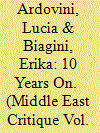

|
|
|
|
|
| Summary/Abstract |
Although the popular protests that swept across the Middle East and North Africa in 2011 were short-lived, their long-term consequences are still resonating through the region a decade after their outbreak. Islamist movements have been affected in different ways by the drastic change in the political, social and geographical contexts in which they historically operated, highlighting the need for a renewed examination of these changed circumstances. Based on the case study of the Egyptian Muslim Brotherhood, we argue that three key factors need to be accounted for when studying Islamist movements in the aftermath of the 2011 uprisings. These are the dimension of exile; the increased role played by women and youth; and the emergence of cross-generational and cross-ideological alliances. The article analyzes these three factors through a comparative study of responses by Muslim Brotherhood and Muslim Sisterhood members to repression across Egypt, Turkey and the UK.
|
|
|
|
|
|
|
|
|
|
|
|
|
|
|
|
| 2 |
ID:
165138


|
|
|
|
|
| Summary/Abstract |
This paper examines the location and production of liminality with regard to voting rights of Tibetan exile community in India. Liminality is related here to the legal and bureaucratic ‘inbetweenness’ that characterises and orders the life of the Tibetan exiles in India. Tibetans born in India have been registered as voters in India’s electoral list albeit without an accompanying claim or path to citizenship. The paper argues that these voting rights are simultaneously contested and embraced by the Tibetan exile community. Responses of the exile community to voting rights are produced by the interaction between (a) the lived experience of statelessness and (b) complex constructions of cultural, political and legal identity. Both these factors are fundamentally informed by the liminal space that the exile community inhabits in India.
|
|
|
|
|
|
|
|
|
|
|
|
|
|
|
|
| 3 |
ID:
166766
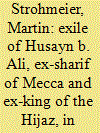

|
|
|
|
|
| Summary/Abstract |
This article deals with the exile of Husayn ibn Ali, ex-sharif of Mecca and ex-king of the Hijaz, in Cyprus (1925–1930). It was not politics, but the adversities of everyday life that shaped the ex-king’s stay in the British colony. Loss of prestige, estrangement, uncertainty about the future, lawsuits, financial problems and the death of his wife contributed to failing health which ultimately led to his relocation to Amman. A special, perhaps unique feature of Husayn’s enforced residence in the island is that the power which exiled him also granted him asylum. This article examines his living conditions, experience with and image in the local community, relations with his sons as well as his dealings with British authorities. In this way the progressive isolation and marginalization of an ex-monarch in exile becomes evident.
|
|
|
|
|
|
|
|
|
|
|
|
|
|
|
|
| 4 |
ID:
122650


|
|
|
|
|
| Publication |
2013.
|
| Summary/Abstract |
This article is a commentary on Elizabeth Dauphinee's book The Politics of Exile. Its focus is on her displacement - her dual sojourn that is, on the one hand, a physical migration (from Canada to Bosnia for research) and, on the other, a genre migration (from academic to literary writing). The main part of the analysis situates Dauphinee's contribution among the Balkans War reflections of diverse exilic artists from the former Yugoslavia (writers and a film director), and the article ends by situating Dauphinee's method within two analytics: Jacques Rancière's concept of indisciplinarity and Cesare Casarino's concept of philopoesis.
|
|
|
|
|
|
|
|
|
|
|
|
|
|
|
|
| 5 |
ID:
189014
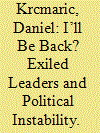

|
|
|
|
|
| Summary/Abstract |
Exile is often considered a useful political solution that can coax violent or unpopular leaders out of power. But these “golden parachutes” may come with a price. Specifically, do exiled leaders increase instability back in their home countries? In this paper, we outline the mechanisms through which exiled rulers can destabilize their home state’s politics and ultimately increase conflict. We present two types of evidence to support the argument. The first is a cross-national analysis that uses our original Leaders in Exile dataset to examine how exiled leaders shape the likelihood of civil conflicts, coups, and protests. The second is a cross-leader analysis designed to minimize inferential concerns by comparing cases where leaders escape into exile with cases where leaders are killed. In both tests, we find that exiled leaders are linked to political instability in their home countries.
|
|
|
|
|
|
|
|
|
|
|
|
|
|
|
|
| 6 |
ID:
177701
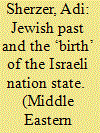

|
|
|
|
|
| Summary/Abstract |
The article focuses on David Ben-Gurion’s past image using a series of programmatic and widely distributed speeches he made during Israel’s first Independence Days (1948-1958). The article argues that while the founding of the state was defined as a turning point it was certainly not portrayed as a ‘beginning’, and that both the ancient sovereign and the exilic Jewish experience had a central place in Ben-Gurion’s relevant past. At the centre of discussion stand five main characteristics of the speeches: the continuation between the state and the Jewish ancient past; the central place of a secularized messianism as a bridge between the exilic past and the sovereign present; the attempt to portray a widely accepted shared past using consensus-based terminology; the simplification of the Zionist rebellion against the exile; and the fundamental differentiation between the Jewish symbolic past and the realistic Israeli present. These five elements are analysed against the background of other texts by Ben-Gurion and his image in the research. Finally, this case study is placed within a wider context which demonstrates the Israeli quest for a Jewish framework of meaning that would authenticate the new national myths and charge them with meaning.
|
|
|
|
|
|
|
|
|
|
|
|
|
|
|
|
| 7 |
ID:
125895
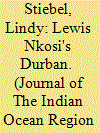

|
|
|
|
|
| Publication |
2013.
|
| Summary/Abstract |
Lewis Nkosi, the late exiled South African writer, and the city of Durban, an extended urban space of an estimated 3 million inhabitants, are incontrovertibly linked. This sprawling Indian Ocean town is where Nkosi was born, where he was educated as a small child, where he started his working career, and where he was finally buried on 10 September 2010. Given the centrality of Durban to Nkosi's life story, it is unsurprising that this city periodically appears in Nkosi's writing, both fictional and non-fictional, as a geographical 'setting' but also as a symbol of political change in South Africa. This paper, then, begins an evaluation of the role of 'Durban' and the Indian Ocean in the life and work of Nkosi, drawing from his novel Mating birds, and also from a little known article published in a Swiss newspaper, translated into German. Durban emerges from these various sources as a city in flux, a place of startling contrasts, a melting pot of peoples and a dream space called 'home' for this celebrated writer.
|
|
|
|
|
|
|
|
|
|
|
|
|
|
|
|
| 8 |
ID:
130645
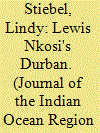

|
|
|
|
|
| Publication |
2013.
|
| Summary/Abstract |
Lewis Nkosi, the late exiled South African writer, and the city of Durban, an extended urban space of an estimated 3 million inhabitants, are incontrovertibly linked. This sprawling Indian Ocean town is where Nkosi was born, where he was educated as a small child, where he started his working career, and where he was finally buried on 10 September 2010. Given the centrality of Durban to Nkosi's life story, it is unsurprising that this city periodically appears in Nkosi's writing, both fictional and non-fictional, as a geographical 'setting' but also as a symbol of political change in South Africa. This paper, then, begins an evaluation of the role of 'Durban' and the Indian Ocean in the life and work of Nkosi, drawing from his novel Mating birds, and also from a little known article published in a Swiss newspaper, translated into German. Durban emerges from these various sources as a city in flux, a place of startling contrasts, a melting pot of peoples and a dream space called 'home' for this celebrated writer.
|
|
|
|
|
|
|
|
|
|
|
|
|
|
|
|
| 9 |
ID:
171069
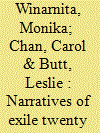

|
|
|
|
|
| Summary/Abstract |
In response to Indonesia’s 1998 riots, which included mass rape of Chinese-Indonesian women, many Chinese-Indonesian families sent their daughters out of country to try and ensure their safety. Drawing on interviews with Chinese-Indonesian women currently living in Singapore and Australia, this article considers the long-term effects on transnational families of this departure. In contrast to current views of Chinese-Indonesians as an affluent diaspora, we show Chinese-Indonesian women’s experience to be that of exile, living outside Indonesia with little possibility of permanent return. We illuminate the subtle and enduring effects of political violence on women’s marital, reproductive, and childrearing practices. Interviews reveal fragmented identities and contingent household formations which enabled family resilience for some but created long-term fissures for the majority. We argue for more critical attention to how gender mutually constitutes experiences of exile, and the long-term impacts of political violence on reproduction and family relations for Chinese-Indonesian women.
|
|
|
|
|
|
|
|
|
|
|
|
|
|
|
|
| 10 |
ID:
131809
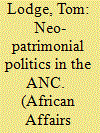

|
|
|
|
|
| Publication |
2014.
|
| Summary/Abstract |
Following Jacob Zuma's ascension to the presidency in South Africa, the African National Congress (ANC) has been dogged by rumours of escalating corruption and the personalization of power. This article documents these trends and explores three ways of understanding neo-patrimonialism in South Africa's ruling party. First, the article addresses the possibility that such political habits have a long history within the ANC but were restricted during its years in exile and have begun to resurface now that the armed struggle is over. Second, it considers explanations that relate to the party's historical ties to criminal networks and pressures arising from the transition to majority rule and contemporary electoral politics. Finally, the article investigates whether neo-patrimonialism is a reflection of broader tendencies within South African political and economic life. All three factors are found to have played a role in the rise of neo-patrimonial politics, and it is the confluence of these trends that explains why these dynamics have taken such a strong hold on the party.
|
|
|
|
|
|
|
|
|
|
|
|
|
|
|
|
| 11 |
ID:
131653
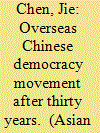

|
|
|
|
|
| Publication |
2014.
|
| Summary/Abstract |
The overseas Chinese democracy movement, sustained by exiled Chinese dissidents in the West, has just reached its 30th anniversary. Despite a widely held view that it has declined and failed irrevocably from its moral and political height during the first half of the 1990s, new trends have emerged.
|
|
|
|
|
|
|
|
|
|
|
|
|
|
|
|
| 12 |
ID:
157855
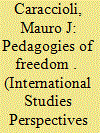

|
|
|
|
|
| Summary/Abstract |
This article contributes to calls for a reflexive ethnography of academic life by examining the relationship between exile and courage in the work of Paulo Freire. I turn to Freire’s experience of exile and the role it plays in his critical pedagogy in order to develop a reflexive framework linking scholarly encounters with global politics and different forms of courage. I begin my analysis with a portrait of Freire’s life and work, focusing on the distinct elements in his writing that contribute to what I call an exilic reflexivity. I then turn to Freire’s writing on conscientization, pedagogy, and the role of ideology in higher education to highlight missed opportunities by international relations (IR) scholarship to engage with alternative forms of existential courage. Freire’s approach to education offers IR scholars an opportunity to rethink exile in light of ongoing structural challenges within the political economy of academic life. While Freire was not an IR scholar as such, his work is positioned against similar economic, political, and ideological constraints on contemporary academia, conveying a pedagogy of freedom that remains highly relevant today.
|
|
|
|
|
|
|
|
|
|
|
|
|
|
|
|
| 13 |
ID:
161094
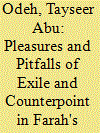

|
|
|
|
|
| Summary/Abstract |
Taking as its starting point Edward Said's appropriation of the concept of counterpoint, late style, and exile in Culture and Imperialism and On Late Style, this essay examines the thematic and literary implications of Nuruddin Farah's counterpoint and exile, as manifested in Maps. More concretely, building on Said's secular and humanist examination of counterpoint, late style, and exile as embodying a form of musical, aesthetic and sociopolitical criticism and resistance, this essay examines the way in which Nuruddin Farah addresses the aesthetic and home in Somalia as a counterpoint to the dictatorial masculine oppression of the regime from a contrapuntal and exilic perspective. The theme of postcolonial transnational feminism as a contrapuntal sign of resistance and late style is examined and interrogated in Farah's Maps in various ways. I investigate contrapuntally the way in which Somalian women, as portrayed in Farah's selected works, stand up to challenge the hegemonic patriarch and postcolonial regime in Somalia, as represented by the General Siad Barre and the oligarchy. Somalian female identity foregrounds itself in a pertinent and humanist way within a postcolonial feminist context.
|
|
|
|
|
|
|
|
|
|
|
|
|
|
|
|
| 14 |
ID:
174260


|
|
|
|
|
| Summary/Abstract |
This paper examines Mahmoud Darwish's exploration of the political, geographical, existential, and metaphysical dimensions of displacement, banishment, and statelessness in his 2005 lyrical epic “Exile.” The paper offers an analysis of Darwish's treatment of dialectic, heteroglossia, the juxtaposition of the national and the existential, and conflicting temporalities, as well as political uncertainty and metaphysical fear. With particular reference to the paradoxical portrayal of space in “Exile”—the juxtaposition of the near and far, real and illusory, localized and dispersed—I also examine the ways in which Palestinian identity, as narrated in this poem, is destabilized and dispersed by what Michel Foucault calls “heterotopic space.”
|
|
|
|
|
|
|
|
|
|
|
|
|
|
|
|
| 15 |
ID:
106558
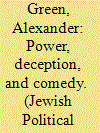

|
|
|
| 16 |
ID:
131699


|
|
|
|
|
| Publication |
2014.
|
| Summary/Abstract |
Hannah Arendt's characterisation of the refugee as rightless and stateless has become a touchstone for scholars grappling with the nature of forced migration and exile. While aspects of Arendt's depiction continue to resonate, the notion of refugees as stateless, rightless 'scum of the earth' is now in many cases anachronistic, and no longer clearly reflects the challenges now faced by the majority of the world's refugees. This is attributable to structural changes in the refugee regime, particularly the increased focus on repatriation and the reconstitution of the relationship between refugees and their states of origin, a possibility largely unforeseen by Arendt. Drawing on the example of the Guatemalan repatriation movement, this article contends that indiscriminately portraying refugees as stateless represents a potential disservice to the displaced, as it may inadvertently undermine refugees' claims against their states of origin for the redress of their rights as citizens. There is a need to expand theorising on refugees from a narrow focus on the refugee as rightless and stateless to a broader conception of the refugee as a bearer of claims for the renegotiation of her relationship with her state.
|
|
|
|
|
|
|
|
|
|
|
|
|
|
|
|
| 17 |
ID:
181330


|
|
|
|
|
| Summary/Abstract |
Narratives of the Indian revolutionary movement in exile have often focused on abstract notions of ‘London’—with a particular focus on ‘India House’ in Highgate—or ‘Paris’ without taking into account specific geographies of Indian anti-colonialism within these imperial metropoles. Drawing on addresses provided in intelligence reports, this article takes a spatial approach and explores how particular areas of London and Paris enabled the development of the Indian revolutionary movement in exile in the early twentieth century.
|
|
|
|
|
|
|
|
|
|
|
|
|
|
|
|
| 18 |
ID:
190307


|
|
|
|
|
| Summary/Abstract |
Academic research focused on Tibetan women-in-exile is rare. Also, very few existing studies explore the perspectives of Tibetan women on the Tibetan nation and their contributions to Tibetan nationalism. Therefore, considering this gap in the literature, this paper explores the question of the Tibetan nation from the perspectives of Tibetan women-in-exile and seeks to understand their contributions to Tibetan nationalism. The paper draws from qualitative interviews conducted with Tibetan women in Dharamsala. The findings indicate that as agents and symbols of nationalism, educated Tibetan women-in-exile express ambivalence in their ideas of Tibetan women’s contributions to Tibetan nationalism. Their narratives help us expand our understanding of Tibetan nationalism and reveal how women as active agents of nationalism contribute to the Tibetan movement. At the same time, the paper argues, the Tibetan women-in-exile have not escaped the symbolism of nationalism attributed to them by the larger Tibetan society.
|
|
|
|
|
|
|
|
|
|
|
|
|
|
|
|
| 19 |
ID:
097818


|
|
|
|
|
| Publication |
2010.
|
| Summary/Abstract |
This article, mostly based on the information given to the authors by representatives of Tibetan Communities in Europe, focuses on Tibetans in Europe. It tackles the difficult question of statistical data before addressing the current situation of Tibetans in Europe, and more specifically in Switzerland, France and Germany, which constitute very different cases, both in terms of the socio-economic positions held by the Tibetans and in terms of the relationship established by the Tibetans with the countries of residence. It then deals with the link Tibetans in Europe have with the Tibetan Government-in-Exile, notably through the Offices of Tibet established in Geneva, Paris, Brussels and London. It also addresses the question of how Tibetans can work as a group in Europe. It thus looks at the type of connection that Tibetan associations and non-governmental organisations, Tibet support groups, as well as Tibetan monasteries and Buddhist centres can help establish between Tibetans throughout Europe. It concludes by examining the attraction of Europe to young Tibetans: what are indeed the new possibilities and challenges they face when coming to Europe?
|
|
|
|
|
|
|
|
|
|
|
|
|
|
|
|
| 20 |
ID:
170485


|
|
|
|
|
| Summary/Abstract |
The theoretical concepts of time and waiting have evolved mostly around the units of clocks and calendars. The Palestinians have been forced to let waiting be part of their national and cultural life. The forced displacement has scattered many Palestinians in exile around the globe. These Palestinians in diasporas have been waiting to return home one day and this perpetual state of waiting is one of the greatest tragedies of our time. The Palestinians' experience of time and waiting are quite different from most parts of the world. The linearity of time seems to break its rhythm when it enters Palestinian lives. The temporality appears to have multiple dimensions when it comes to Palestine. There are times when the clock is not the reference point of Palestinians' time, and hours and minutes can no longer gauge their waiting. They have given a new meaning to time, waiting and exile through not only the physical existence of their being, but also through their literature and art. Although we live in a culture that denigrates waiting, we have a whole Palestine hanging on for what can put an end to its wait. The concept of time, waiting and exile suddenly jumps out of the theoretical notions and embodies itself in Palestine. Palestinians' literature, movies and other art forms have encompassed these ideas to strengthen their collective memory and identity. The life of a dispossessed Palestinian has many internal contradictions that are at times not obvious but beyond the contradiction typically experienced by individuals in life. The Palestinian struggle for land is also a struggle against the established unitary idea of time and waiting of colonizers. This article will try to delve into such meanings of time and waiting for Palestinians in their cultural lives and their everyday existence.
|
|
|
|
|
|
|
|
|
|
|
|
|
|
|
|
|
|
|
|
|